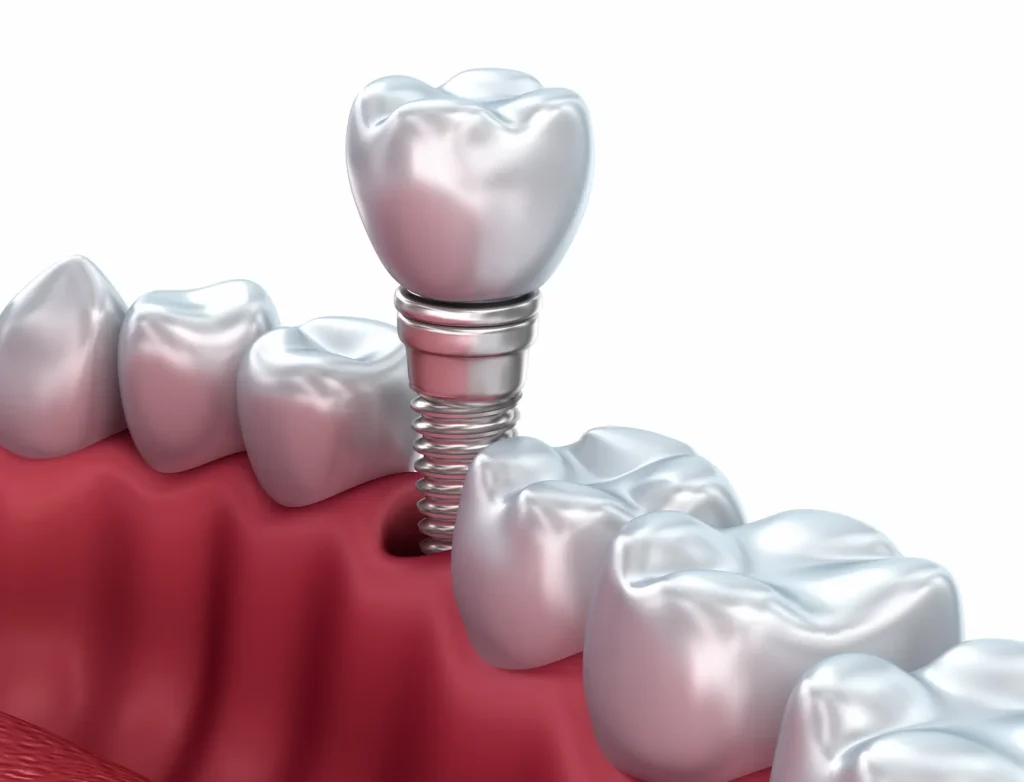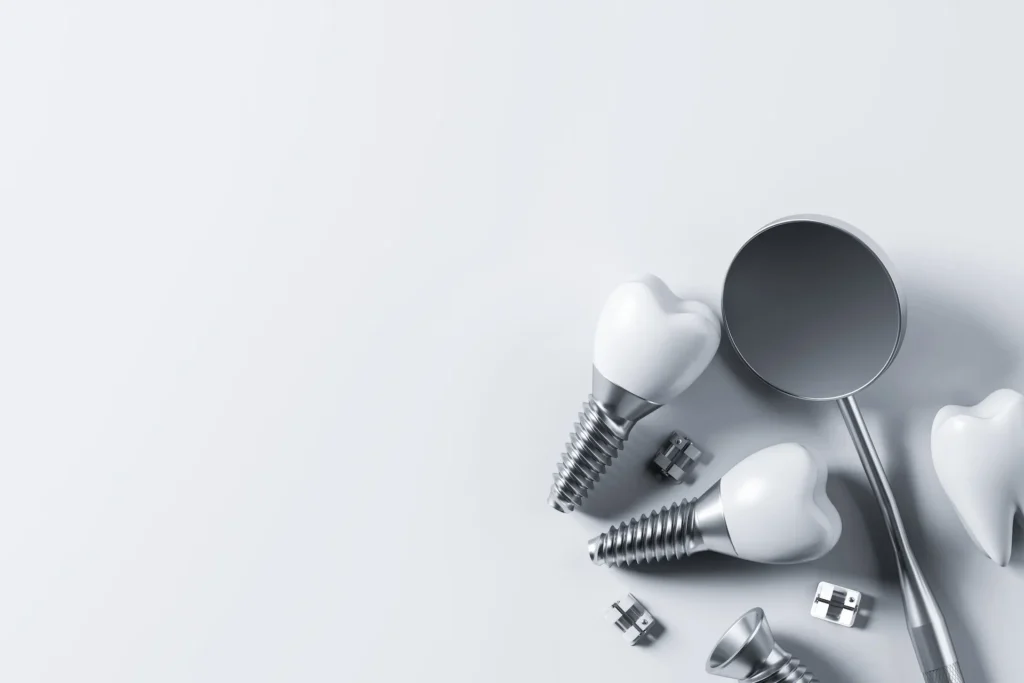Dental implants are a reliable and long-lasting option for teeth replacement that can restore your natural smile, restore functionality, and improve your oral health. But what happens when a dental implant screw falls out? What do you do next?
While dental implants are a reliable teeth replacement option, some potential risks and complications can occur, such as a dental implant screw falling out.
If your dental implant screw falls out, take action as soon as possible! A dental implant screw falling out can be a sign of failure and cause the implant to loosen and become unstable. Getting in touch with a Houston-based dental implant specialist can help you determine the best course of action to restore your dental implant.
This article will cover everything you need to know about dental implant screws, how to prevent them from falling out, and what to do if it does.
Understanding Dental Implant Screws
Dental implants have three main components: the implant itself, the abutment, and the implant screw.
- The implant is a titanium cylindrical post surgically placed in the jawbone to act as the foundation for the replacement tooth.
- The abutment is a connector piece placed on top of the implant and serves as the base for the replacement tooth.
- The implant screw is a titanium fastener that connects the abutment to the implant and helps secure it.
The implant screw is essential for a dental implant’s stability and longevity because it helps secure the abutment to the implant. Without the implant screw, the abutment may not be able to stay in place, creating an unstable foundation for the replacement tooth.
The implant screw helps ensure the abutment does not move around, leading to further complications such as bone resorption or infection.
But what causes a dental implant screw to come loose?
Common reasons why a dental implant screw may become loose or fall out include the following:
- Inadequate osseointegration occurs when the implant fails to fuse with the surrounding bone.
- Excessive biting forces can cause the implant screw to become loose or separate from the implant.
- Improper placement of the implant screw can also lead to it becoming loose or falling out.
Having a qualified dental professional perform dental implant procedures can help prevent these issues.
Recognizing the Signs of a Loose Implant Screw

How can you tell when an implant screw is loose? There will be obvious signs, such as the feeling of the implant shifting accompanied by pain or discomfort. But regular dental check-ups are essential to detect potential issues before they become problems.
Besides regular checkups, you can also assess whether their dental implant screw is loose by gently tapping the implant area or noticing changes in bite alignment.
Immediate Steps to Take
If your dental implant screw falls out, it is important to remain calm and not panic. Panicking can worsen the situation, and remember that a dental implant screw falling out does not necessarily mean your implant is failing. This is a common issue that can be remedied by professional attention.
Contact your dental implant specialist or dentist as soon as possible to schedule an emergency appointment. Attempting to reinsert a dental implant screw is not recommended, as it requires professional knowledge and expertise. A dental implant specialist like Dr. Raouf Hanna can assess the situation and provide the best possible outcome.
What Your Dental Implant Specialist Will Do
If you experience a dental implant screw falling out, seeking professional help immediately is essential. Your dental implant specialist will thoroughly assess the implant site and surrounding tissues. The specialist will also consider the dental implant’s stability and integrity, ensuring its long-term success.
Your specialist may recommend reinserting the existing dental implant screw or replacing it with a new one, but this will depend on the condition of the implant site, the length of the screw, and its stability. The specialist will evaluate the situation and make a recommendation that will best serve your needs and goals.
The dentist will evaluate the implant site and surrounding tissue to ensure the overall stability and integrity of the dental implant. The specialist will also consider the length of the dental implant screw and its stability. This assessment will ensure the long-term success of the dental implant.
Now that you know how to react if a screw falls out, let’s look at how to prevent it from happening in the first place.
Preventive Measures for Future Complications

Always follow the post-implant surgery instructions to ensure you give the implant screw the best chance of success. But besides following the instructions, you should remember to maintain good oral hygiene practices, such as regular brushing, flossing, and professional cleanings.
Good oral hygiene is essential for keeping your implant healthy and functioning properly. Neglecting proper oral hygiene practices can lead to infection and further damage the implant site.
If you experience discomfort or have concerns with your implant, contact your dental professional promptly. Proactive management of any potential issues can help prevent further complications and ensure the successful integration of the implant.
Potential Complications and Long-Term Solutions
The longer the implant is left untreated, the higher the risk of complications such as infection and bone loss. Therefore, you should contact your dentist immediately. If the implant is left untreated for too long, it may be difficult to restore the implant’s stability and functionality.
Treatment options for restoring the implant’s stability and functionality will vary based on the individual’s circumstances. The implant may need to be replaced, or additional procedures may be necessary to restore the implant’s stability and functionality. A thorough examination and consultation with a dental professional is important to determine the most appropriate treatment.
Collaborating with a dental professional is important to determine the most appropriate long-term solution based on individual circumstances. At Hanna Dental Implant Center, our team of experienced specialists is dedicated to providing high-quality care with a personalized approach. We offer a range of treatment options to help patients restore their implants and improve their quality of life.
FAQs
What do you do if a dental implant screw falls out?
If a dental implant screw falls out, it’s important to contact your implant specialist as soon as possible. Your implant specialist can assess the situation and determine the best course of action. They may recommend a follow-up appointment or a more extensive treatment plan depending on the situation.
What causes an implant screw to fall out?
Several potential causes for a dental implant screw to fall out include mechanical failure, incorrect placement, or infection. It’s important to consult with your implant specialist to determine the cause and the best course of action.
Can a dental implant screw be replaced?
Yes, a dental implant screw can be replaced. Depending on the cause, your implant specialist may recommend replacing the screw with a new one or opting for a more comprehensive treatment plan.
How often do implant screws come loose?
Dental implant screws are generally very secure and rarely come loose. However, it’s important to note that the success of an implant procedure depends on several factors, including the implant’s quality and the implant specialist’s skill. In general, the success rate of a dental implant is very high, and the risk of a screw coming loose is low.
What should you do if your dental implant screw falls out?
When faced with a dental implant screw falling out, you should consult a dental specialist with a proven track record and expertise in the field. Dr. Raouf Hanna of the Hanna Dental Implant Center is a Board Certified Specialist with a wealth of experience in the field and can help you determine the best course of action for your implant.
Are you looking for same-day dental implant services in Houston? Contact us today.



